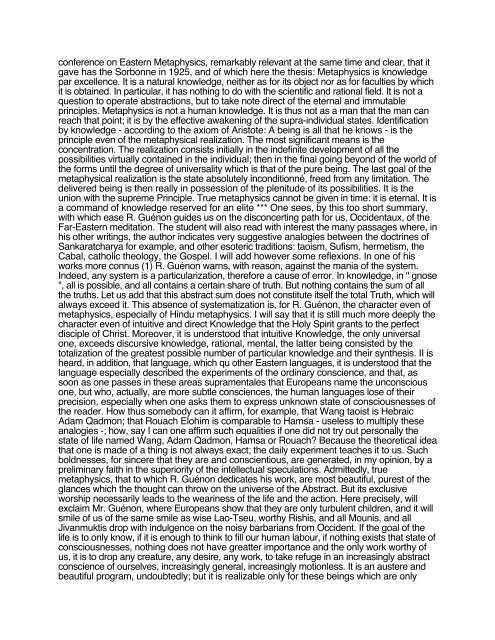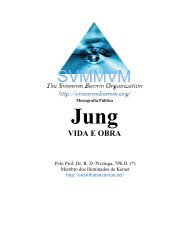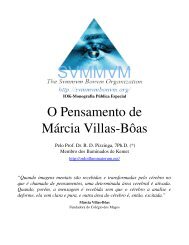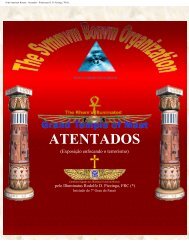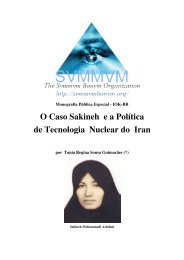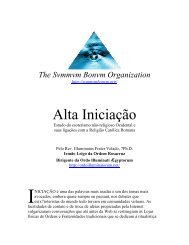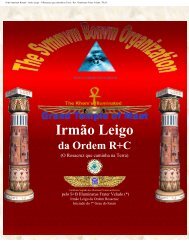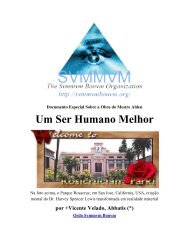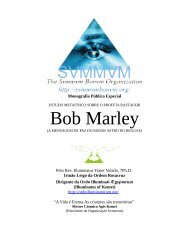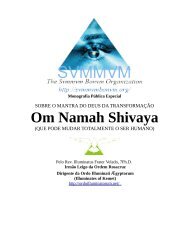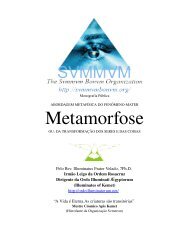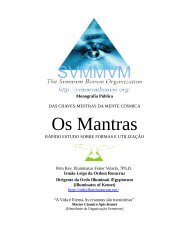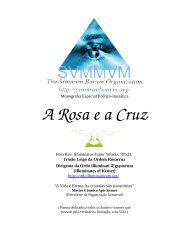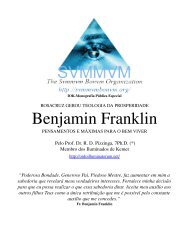History Of The Rose-Croix Sedir - Ordo Svmmvm Bonvm
History Of The Rose-Croix Sedir - Ordo Svmmvm Bonvm
History Of The Rose-Croix Sedir - Ordo Svmmvm Bonvm
You also want an ePaper? Increase the reach of your titles
YUMPU automatically turns print PDFs into web optimized ePapers that Google loves.
conference on Eastern Metaphysics, remarkably relevant at the same time and clear, that it<br />
gave has the Sorbonne in 1925, and of which here the thesis: Metaphysics is knowledge<br />
par excellence. It is a natural knowledge, neither as for its object nor as for faculties by which<br />
it is obtained. In particular, it has nothing to do with the scientific and rational field. It is not a<br />
question to operate abstractions, but to take note direct of the eternal and immutable<br />
principles. Metaphysics is not a human knowledge. It is thus not as a man that the man can<br />
reach that point; it is by the effective awakening of the supra-individual states. Identification<br />
by knowledge - according to the axiom of Aristote: A being is all that he knows - is the<br />
principle even of the metaphysical realization. <strong>The</strong> most significant means is the<br />
concentration. <strong>The</strong> realization consists initially in the indefinite development of all the<br />
possibilities virtually contained in the individual; then in the final going beyond of the world of<br />
the forms until the degree of universality which is that of the pure being. <strong>The</strong> last goal of the<br />
metaphysical realization is the state absolutely inconditionné, freed from any limitation. <strong>The</strong><br />
delivered being is then really in possession of the plenitude of its possibilities. It is the<br />
union with the supreme Principle. True metaphysics cannot be given in time: it is eternal. It is<br />
a command of knowledge reserved for an elite *** One sees, by this too short summary,<br />
with which ease R. Guénon guides us on the disconcerting path for us, Occidentaux, of the<br />
Far-Eastern meditation. <strong>The</strong> student will also read with interest the many passages where, in<br />
his other writings, the author indicates very suggestive analogies between the doctrines of<br />
Sankaratcharya for example, and other esoteric traditions: taoism, Sufism, hermetism, the<br />
Cabal, catholic theology, the Gospel. I will add however some reflexions. In one of his<br />
works more connus (1) R. Guénon warns, with reason, against the mania of the system.<br />
Indeed, any system is a particularization, therefore a cause of error. In knowledge, in " gnose<br />
", all is possible, and all contains a certain share of truth. But nothing contains the sum of all<br />
the truths. Let us add that this abstract sum does not constitute itself the total Truth, which will<br />
always exceed it. This absence of systematization is, for R. Guénon, the character even of<br />
metaphysics, especially of Hindu metaphysics. I will say that it is still much more deeply the<br />
character even of intuitive and direct Knowledge that the Holy Spirit grants to the perfect<br />
disciple of Christ. Moreover, it is understood that intuitive Knowledge, the only universal<br />
one, exceeds discursive knowledge, rational, mental, the latter being consisted by the<br />
totalization of the greatest possible number of particular knowledge and their synthesis. II is<br />
heard, in addition, that language, which qu other Eastern languages, it is understood that the<br />
language especially described the experiments of the ordinary conscience, and that, as<br />
soon as one passes in these areas supramentales that Europeans name the unconscious<br />
one, but who, actually, are more subtle consciences, the human languages lose of their<br />
precision, especially when one asks them to express unknown state of consciousnesses of<br />
the reader. How thus somebody can it affirm, for example, that Wang taoist is Hebraic<br />
Adam Qadmon; that Rouach Elohim is comparable to Hamsa - useless to multiply these<br />
analogies -; how, say I can one affirm such equalities if one did not try out personally the<br />
state of life named Wang, Adam Qadmon, Hamsa or Rouach? Because the theoretical idea<br />
that one is made of a thing is not always exact; the daily experiment teaches it to us. Such<br />
boldnesses, for sincere that they are and conscientious, are generated, in my opinion, by a<br />
preliminary faith in the superiority of the intellectual speculations. Admittedly, true<br />
metaphysics, that to which R. Guénon dedicates his work, are most beautiful, purest of the<br />
glances which the thought can throw on the universe of the Abstract. But its exclusive<br />
worship necessarily leads to the weariness of the life and the action. Here precisely, will<br />
exclaim Mr. Guénon, where Europeans show that they are only turbulent children, and it will<br />
smile of us of the same smile as wise Lao-Tseu, worthy Rishis, and all Mounis, and all<br />
Jivanmuktis drop with indulgence on the noisy barbarians from Occident. If the goal of the<br />
life is to only know, if it is enough to think to fill our human labour, if nothing exists that state of<br />
consciousnesses, nothing does not have greatter importance and the only work worthy of<br />
us, it is to drop any creature, any desire, any work, to take refuge in an increasingly abstract<br />
conscience of ourselves, increasingly general, increasingly motionless. It is an austere and<br />
beautiful program, undoubtedly; but it is realizable only for these beings which are only


